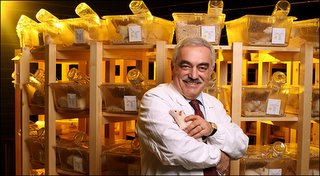
[This post formatting is driving the Dodger(s) nuts.]
The Dodger(s) had assumed the conventional non-carcinogenicity of aspartame because it's a dipeptide of two standard amino acids. It's not that these are nutrients, because vitamins like the chemoprevention studies can increase cancer. It's that these amino acids are substantial parts of diet already, and lots of them around. They are macro nutrients.However, now we have to rethink. Corn oil causes pancreatic cancer in rats. Shifts in the fat content of diet can alter tumor frequencies. But the Times summary suggests the dosing levels were relatively low compared to shifting sources of caloric intake.
The Ramazzini protocol involves lifetime exposure rather than terminating dosing and the animals at two years.
Although it probably violates copyright, the Dodger(s) couldn't resist the rat in the picture.
http://www.nytimes.com/2006/02/12/business/yourmoney/12sweet.html?_r=1&adxnnl=1&oref=slogin&adxnnlx=1139832763-IsrK11SUkARIAxM16EU1ZATheLowdown on Sweet? |

No comments:
Post a Comment